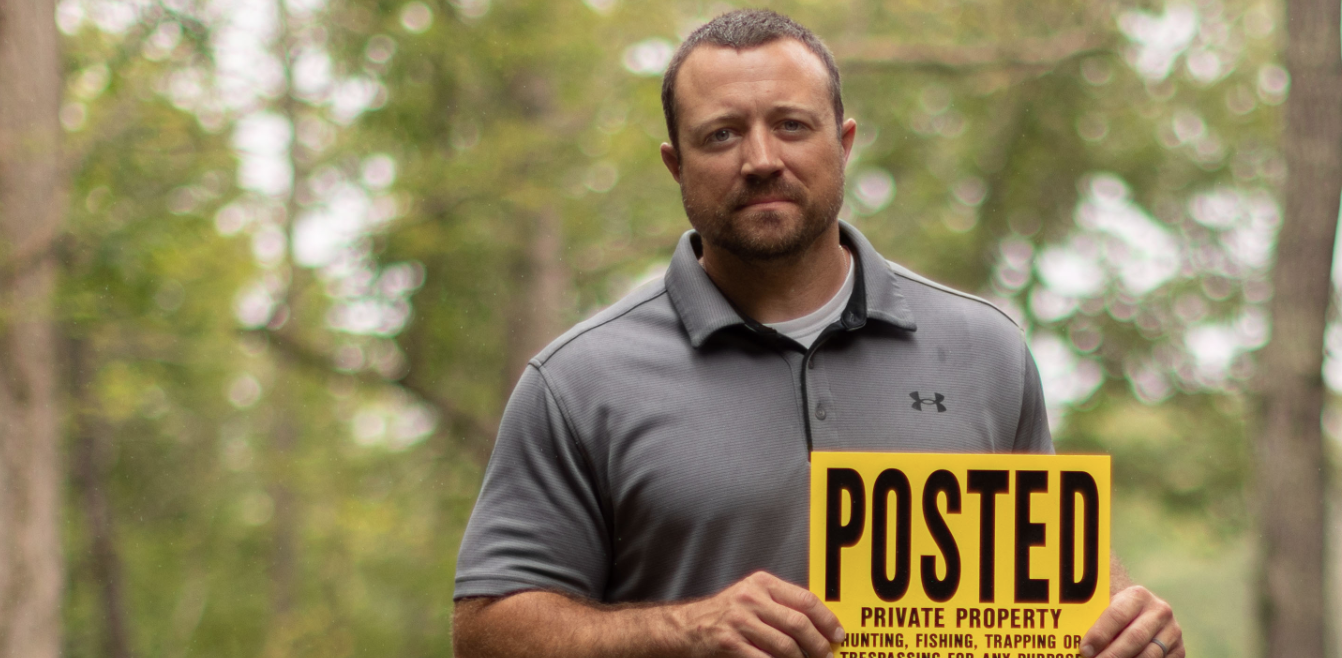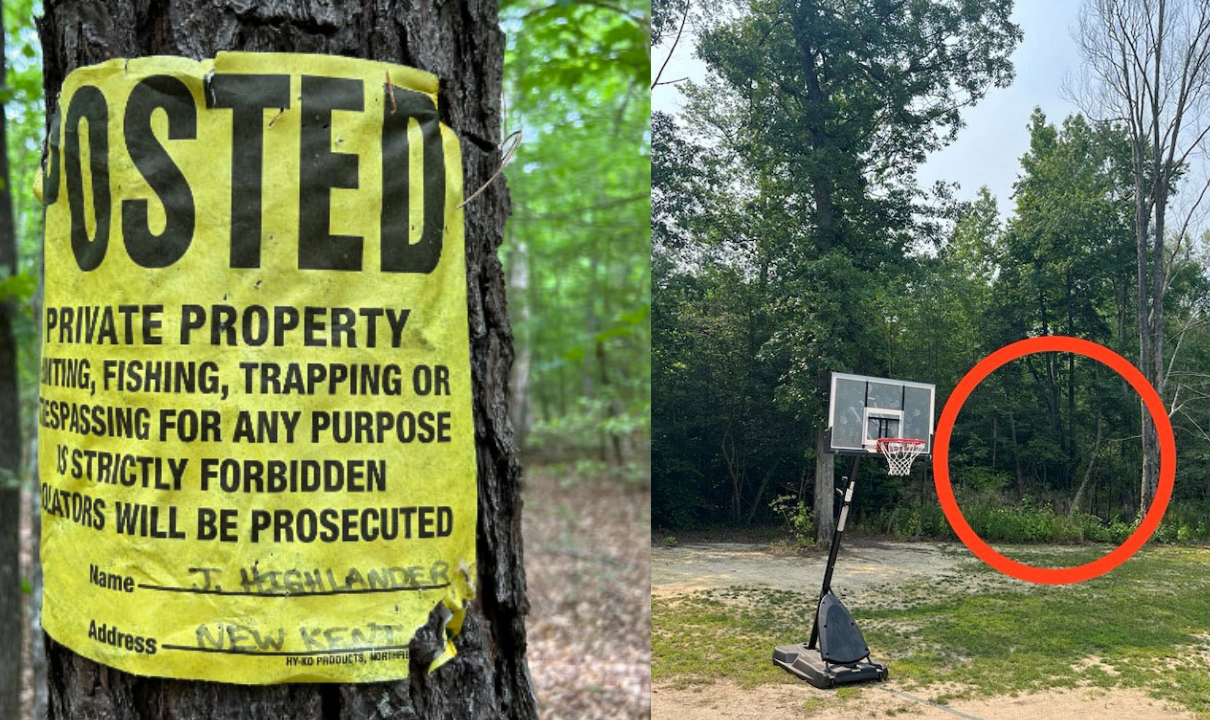Subscribe
In April, a Virginia conservation police officer (known as a “game warden”) walked into the yard of a man named Joshua Highlander, saw a surveillance camera he had set up in his backyard, confiscated it without a warrant, and saved the photos from it.
I heard about Highlander’s case soon after I wrote about a town in Michigan hiring a drone operator to surveil one of its resident’s property. I called Highlander’s lawyer, Joe Gay, and explained that I’d been writing about surveillance for a long time, but wasn’t aware of other cases where law enforcement walked onto private property and confiscated a camera without a warrant. To me, it seemed like such a blatant violation of the man’s Fourth Amendment rights. “Am I missing something here?” I asked.
“No, that’s exactly what happened,” Gay said. “He has a 30-acre property, the warden put on camouflage, they snuck onto the property, they saw he had a trail camera in a field, they took it, they scared his wife and his son, who saw them as they were exiting the property, and they basically rummaged through his camera looking at all the pictures looking for evidence of hunting violations. Game wardens do this thing all the time.”
Conservation police in Virginia are the law enforcement branch of the Department of Wildlife Resources. As Gay mentioned, they enforce hunting rules in the state. Highlander is a deer and turkey hunter who has a series of Tactacam brand cameras on his property that are used to monitor wildlife movements and are popular among hunters.
Highlander was not cited for any sort of violation, but told me that earlier in the day before his camera was seized, he, his brother, and his father each legally shot turkeys elsewhere in the state and logged them (as is required by law) with the Department of Wildlife Resources.
“We all killed a turkey on opening day separately. Most of the time we go together. But we were texting and we were like ‘Man, this is gonna be an awesome picture.’ Next thing you know, my brother’s like ‘I got the wardens on me,’” Highlander told me.
Later that day, the warden came to his house, inspected his property, and confiscated his camera: “The officers put on full camouflage outfits, including ‘leafy jackets’ to blend into Mr. Highlander’s woods,” Gay wrote in a lawsuit filed against the state’s Department of Wildlife Resources. “The officers crossed Mr. Highlander’s property line—walking right past his clearly visible ‘no trespassing’ signs … the officers then seized Mr. Highlander’s camera—physically removing it from the pole to which it was mounted—and then walked out of Mr. Highlander’s property back to their trucks.” Nominally, the warden was looking for evidence that Highlander “baited” his property to entice deer to come there, which would be illegal, or had killed a deer in a way that violated state law. It did not find any evidence of this or any other wrongdoing.

In this case, the officers confiscated the camera, downloaded the images from it (without a warrant), and only later got a warrant to review them. Nothing illegal was found.
At the time, Highlander’s wife and son were playing basketball in the backyard of their house and saw the officers walking through the woods just behind them.
“My wife and my son saw them walking through the woods,” Highlander told me. “Scared the hell out of them.”
The nonprofit public interest law firm Institute for Justice, which Gay works for and which is representing Highlander in this case, has three different cases in three different states in which game wardens walked onto private property looking for evidence of a crime without a warrant. In another case in Tennessee, law enforcement installed its own cameras on private citizen’s land without a warrant. Then in another in Pennsylvania, law enforcement have “repeatedly entered [a hunting club’s] properties without consent or warrants to spy on members and interrogate them about their compliance with hunting laws.”
“DWR does not place any constraints on its officers’ discretion to enter private posted land, to seize cameras from that land, or to access photos physically stored on those cameras. DWR does not, for example, limit the timing, frequency, duration, or scope of its officers’ entries or camera seizures, nor does DWR require its officers to obtain approval from a supervisor (or anybody else) before entering private posted land, seizing a camera from that land, or accessing photos physically stored on that camera,” Gay wrote in the lawsuit. “DWR gives its officers complete, unilateral authority to decide whose property to enter, when to enter it, whose cameras to seize and search, and when to seize and physically search them.”
Law enforcement is able to do this because of a legal argument known as the “Open Fields Doctrine,” which was established in a Supreme Court case called Hester v. United States. That doctrine essentially establishes that Americans don’t have privacy in “open fields,” even if it is privately owned land with posted no trespassing signs (as was the case in all three of Institute for Justice’s cases).
“We’re challenging the Open Fields Doctrine altogether,” Gay said. “One of the things that’s surprising to people is that the Open Fields Doctrine applies to land you’re living on, that you’re using to spend time with your family, to have conversations with your wife, to play with your children. It’s the kinds of places where you expect privacy, and you’d expect that you’d have the power to keep out unwanted intruders, but the way that the government applies the doctrine is that it only extends to the small area around your house called the ‘curtilage,’ not all the space you’re using on a day-to-day basis.”
Gay and Highlander are challenging that in their court case, in part because the camera in this case was located on property that Highlander and his family live on.
“These game wardens and other officials can kind of go onto most land whenever they want, for whatever reason they want, and they don’t have to get a warrant, and there’s no neutral magistrate or judge providing any kind of check on their behavior,” Gay said. He added that he is challenging the Open Fields doctrine specifically under the Virginia Constitution, which establishes a narrower Open Fields doctrine than federal law does. “We think that the camera’s seizure here is an entirely separate and additional level of egregious. What we’ve found is that wardens in this country won’t just enter people’s land, they will sometimes put cameras there to spy on that land, and, as you saw here, they will actually take other people’s cameras and look through it for evidence.”
In its response to Highlander’s lawsuit, the state of Virginia argued that, even if Highlander has a specific right to privacy, he cannot assert that privacy through a lawsuit. “Plaintiff repeats that his property was posted with ‘no trespassing’ signs,” Virginia wrote. “He does nothing, however, to grapple with the clear law that such signs are irrelevant to Fourth Amendment claims.” They also argue that “officers had probable cause to seize the camera” because Highlander was “hunting on the property the day the conservation officers arrived” (which is not illegal), and because of the “officers’ reasonable belief that a crime had been committed.”
A judge in the case dismissed Highlander’s lawsuit because he determined that Highlander essentially doesn’t have standing to bring a suit against the Department of Wildlife. Highlander and Gay are appealing the case to a higher court.
The Virginia Department of Wildlife Resources told 404 Media: "This case is still under investigation so we cannot comment."
This piece has been updated to note that the Virginia Department of Wildlife Resources declined to comment.


